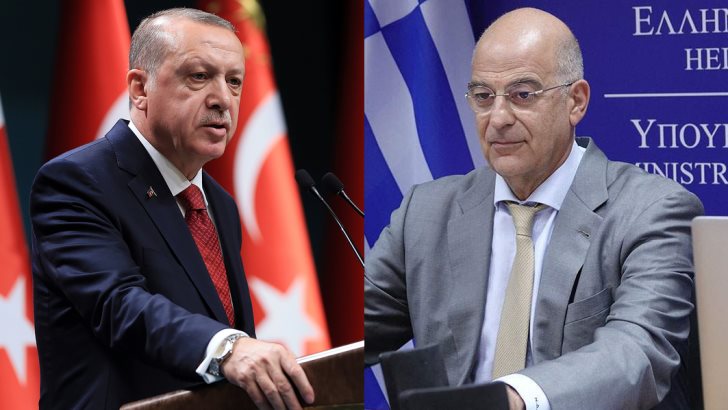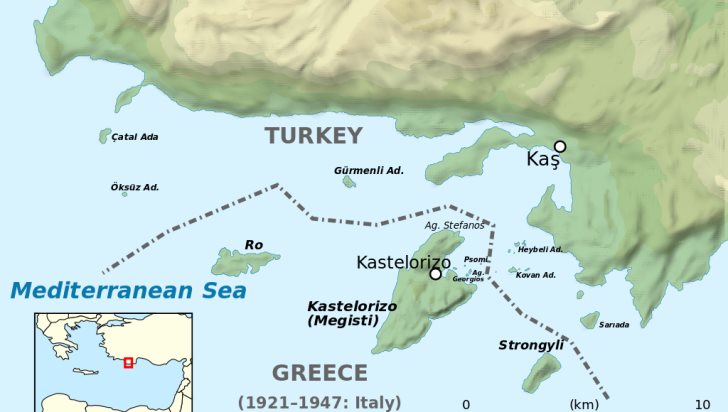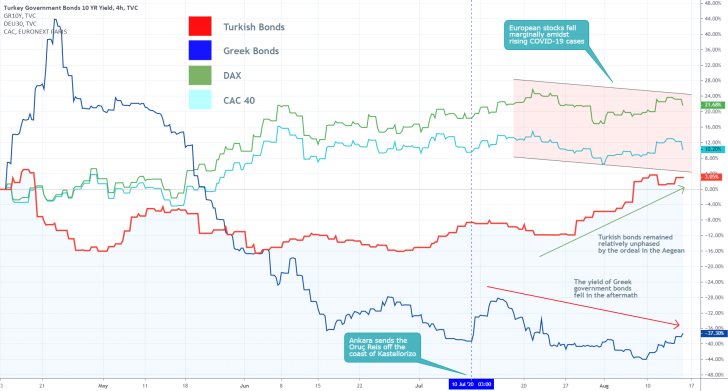
Tensions in the Aegean are heating up quickly as Greece and Turkey clash over disputed maritime territories, edging closer to an armed conflict south of the Greek island of Kastellorizo. The situation in the eastern Mediterranean has been escalating over the last several months, ever since the discovery of hydrocarbon reserves in the region.
Prelude to Confrontation
The boiling point was nearly reached last month when Turkish president Recep Tayyip Erdoğan and his cabinet announced that Turkey would be sending the drillship Oruç Reis off the coast of Kastellorizo to survey the region. Meanwhile, Athens, claiming that this would be a breach of its territorial waters, was ready to retaliate on any provocations by the Turkish side. Part of the perceived provocation was the armed escort of Oruç Reis in the form of several gunboats.

A disaster was averted only due to the last-minute intervention by the German chancellor Angela Merkel, who called Erdogan and acted as a mediator between the two sides. Merkel was able to convince Erdogan to call back the mission, which allowed diplomacy between Athens and Ankara to resume. The two sides then agreed to suspend all drilling and exploration in the region temporarily.
This momentary 'ceasefire' in the dispute was, however, interrupted when Greece signed an agreement with Egypt validating rights for drilling of oil and gas in the region. Turkey subsequently slammed the deal as being "null and void", claiming that the area is located on the country's continental shelf.
The ongoing situation reached a new tipping point when on Monday, Erdogan once again sent the Oruç Reis off the coast of Kastellorizo with its armed escort, as a response to the deal between Greece and Egypt. Meanwhile, Greek foreign minister, Nikos Dendias, urged Turkey to "leave the Greek continental shelf immediately". He also stepped up his shrewd rhetoric by proclaiming that "there will be no tolerance. Greece will defend its territorial integrity and sovereign rights".
Different Points of View
The scramble for energy reserves in the southern Aegean region is escalated by the two countries' different understandings of what constitutes territorial waters.
As far as Greece and its partners in the EU are concerned, the waters off the coast of Kastellorizo belong to the European nation, justified by 'International Law'. According to them, the waters surrounding a nation's island belong to that nation.
As far as Turkey is concerned, Greece has no territorial claims to waters that are part of the 'Turkish continental shelf'. The Turkish foreign ministry stated that the country's sovereign rule over the area had been reported to the United Nations which, according to them, justifies their side's claim.
High Stakes Bluff Game
Essentially, both Ankara and Greece are using their different points of view to contend over rights over the same territory, which is why this regional spat is quickly turning into a delicate international issue. Yet, the fact that tensions have escalated so drastically while the world is predominantly focused on the coronavirus crisis represents a distinct sign of probing with the intent to exploit the situation – one of the two sides could be bluffing and trying to take advantage of the other while the international scene remains muddled by the pandemic fallout.
Why could Turkey be bluffing? If Ankara really believes that International Law is on its side, then there is no reason for Erdogan to send warships alongside the Oruc Reis instead of pursuing a more diplomatic approach. If these waters are indeed part of the Turkish continental shelf, then Ankara would win more if it seeks the judicial way to back up its territorial claims.
This is especially true given Turkey's strained ties with the West over matters of Syrian refugees and its treatment of Kurdish people. Having an aggressive approach when international law is on your side is illogical unless your legislative claims are not as clear-cut as propagated.
The Turkish foreign ministry said that the disputed area has been 'reported to' the United Nations as being part of the country's continental shelf, but that does not necessarily mean that the UN recognises it as such.
Why could Greece be bluffing? So far in the situation, Turkey remains somewhat isolated on the international scene, while Greece has the backing of the EU. While this gives the country massive support in legal terms, it does not necessarily mean that Greece is the clear winner.
Greece's perceived 'bluff' could be understood as a contingency measure. Turkey is arguably the stronger side of the two, in terms of military power, and Greece would have a difficult time ahead in containing more aggressive moves from its eastern neighbour. Even the EU with all of its influence has not been able to deter Turkey's ambitions in the past.
Recently, the EU struggled with compelling Turkey from unleashing a wave of refugees from Syria into European territory. Moreover, the EU was unable to prevent clashes between Turkish forces and Kurdish people in Syria after Donald Trump ordered the withdrawal of US military forces from the country. There are even longer-standing points of contention between the EU and Turkey. Chiefly, the occupation of Cyprus and the refusal of Turkey to acknowledge the Armenian genocide.
Overall, the foreign policy of the EU has had its missteps in the past, and Greek officials might fear that the Union alone would not be able to deter Turkey's military ambitions in the region, in case that tensions continue to boil to the point of armed conflict. Hence, Greece's bluff could be understood as a response to Turkey's probing with the intention to project readiness to defend Greek interests, even if the overall balance of power seems to be in Turkey's favour.
Market Reaction
As the two nations square off in the region, the markets started pricing in the likelihood of a more severe conflict. The yield of the Greek 10-year bond started falling since Monday, which manifests general worry amidst local investors. Meanwhile, the yield of the Turkish 10-year bond registered a marginal appreciation as earlier today, the Turkish lira sunk to its lowest level against the greenback on record.
At the same time, French and German stocks started depreciating, but the hit cannot be attributed solely to the crisis in the Aegean. Part of the contraction is due to the recent spike of COVID-19 cases in Europe.





















